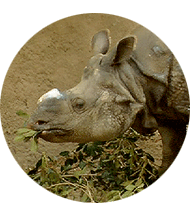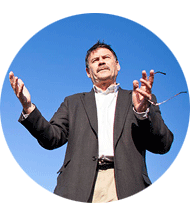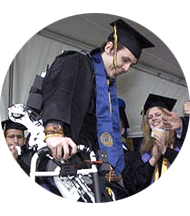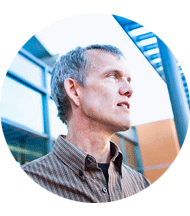
Warning where the Big One will hit
UC Berkeley is partnering with two other universities, a philanthropic foundation and industry to conduct earthquake research that could lead to a warning system. People could then have time to dive for cover, and transportation and utility systems could shut down operations.

Seeding innovation
Decades ago, students helped spur organic farming and laid the ground for sustainable agriculture research and education programs at UC Davis and UC Santa Cruz that are models today for other universities.

Lighting it up, efficiently
Buildings use up to two-thirds of the electricity in the U.S. A UC startup company is developing innovative technologies to curb skyrocketing electrical consumption, energy costs and greenhouse emissions.

Evaluating marine parks in the high seas
California is a leader in protecting marine life and areas, and UC scientists play an important role in studying, advising and shaping policy that must balance the environmental needs of the ocean with those of millions of users.

There's something in the California air
UC professors built and worked in towers as part of the largest single atmospheric research effort in the state. The data they've collected will guide policymakers dealing with air pollution.

Listening in on the brain
UC San Diego scientists are developing technology that links thoughts and commands from the brain to computers. In addition to neat gadgets like mind-dialed cell phones, devices to assist the severely disabled and a cap to alert nodding-off air traffic controllers, new technology could reshape medicine.

Center chases truth about state's crises
A multicampus center connects researchers and people in the community to address poverty, employment, health, the environment and other California issues.

Getting to the root of the water cycle
In a remarkable outdoor laboratory in the Sierra, UC Merced and UC Berkeley researchers use sensors to gather a mother lode of data to greatly improve ecological measurement and hydrologic forecasting.
Ovarian cancer: UC researchers play key role in new treatments, analysis
For many women, a diagnosis of ovarian cancer is a death sentence. More than 14,000 women die of it each year. With symptoms that mimic other ailments, it often is diagnosed at a late stage. The five-year survival rate is just 31 percent; when the cancer becomes resistant to traditional chemotherapy, newer drugs have held it at bay for a few months at best.

Bringing a gold mine of Egyptology online
UCLA scholars developed the world's first comprehensive E-encyclopedia on ancient Egypt, and it is full of information on ancient temples, archaeological treasures, hieroglyphics and more.

Looking at how we listen
UC graduate students are known for their braininess. At UC Berkeley, Adeen Flinker is getting a picture of the brain's intricacies and how the human auditory system is wired.
Graduate student researchers mix technology and humanity
Graduate students are at the heart of UC research. And many package their expertise, creativity and compassion to tackle and solve key problems in California and beyond.

First-ever Zoobiquity conference teams docs, vets to seek cures
Lions, tigers and people - oh, my. A new research initiative will match medical and veterinary students from different UC campuses to work on projects important to both animal and human health.
Rising stars of science
Five UC graduate students and postdoctoral researchers were among innovators named 'Rising Stars of Science: The Forbes 30 under 30.'

Spit in time may help save lives
An ambitious project, teaming Kaiser Permanente and UCSF researchers, takes aim at genetic links to disease.

Wild bee research at UC Natural Reserve System
A large amount of native bee research in California occurs in the wild landscapes protected by the UC Natural Reserve System.

A haven for the spooky and the geeky
With more than 100,000 books, the Eaton Collection at UC Riverside is the world's largest public assortment of science fiction, fantasy, horror and utopian literature. And it is a valuable resource for scholars and researchers worldwide.

Stem cell research heads to the clinic
For more than a decade, stem cell science has raised hopes of cures for a host of diseases and illnesses. Now, the research pace has picked up with lab discoveries moving to tests of therapies for patients.

Crossing borders to kick-start novel research
Scientists in Mexico and at UC study the breeding habits of a remarkable seabird for possible clues about behavioral evolution and how animals may develop immunities. The project is one of many research collaborations supported by UC MEXUS.
Wearable electronics demonstrate promise of brain-machine interfaces
Other research at UC San Diego opens up a slew of previously unimaginable possibilities in the field of brain-machine interfaces well beyond biomedical applications.
Students step up global sustainability research
UC Merced engineering students do real world research, in California and India.

Big help in small packages
UCSF bioengineer Tejal Desai builds medical implants, with parts as tiny as human cells, that may be used to treat diabetes, kidney failure and other diseases.

From pantographs to nanosoldiers
Colin Milburn of UC Davis has investigated how the early history of nanotechnology was influenced by ideas from science fiction. He also studies how scientists use video game hardware and software to run experiments.

The physics of folding clothes
Pieter Abbeel and his UC Berkeley students have developed a robot to help out with laundry. At the Center for Information Technology Research in the Interest of Society, their aim now is to expand the robotic repertoire to aid surgeons.
UC receives more than $25M in stem cell grants
Nineteen UC scientists received $25.8 million in grants May 4 from the state's stem cell agency to study the underlying biology of stem cells.
UC scientists again top NAS membership
Fifteen UC scientists were among new members elected May 3 to the prestigious National Academy of Sciences. As in previous years, more UC faculty were elected than all other public universities combined.

Trimming time in the stacks
A sophisticated text-analyzing tool developed by a UC graduate student could speed literary searches for humanities scholars and other researchers.

Tiny saviors in our backyard
Honey bees get most of the buzz, but some native bees are better at spreading pollen. They may hold the solution to world pollination problems that affect important crops.

Putting the crown on solar power
Someday, solar power will provide all the energy homes and buildings need for electricity, heat and cooling. Scientists at UC Solar, a multicampus research institute based at UC Merced, are helping to make that day come true.

UC's Saul Perlmutter wins Nobel Prize for physics
Saul Perlmutter of Berkeley Lab and UC Berkeley has won the 2011 Nobel Prize for physics for his work with the Supernova Cosmology Project. He is the 57th University of California researcher to be honored with a Nobel Prize.

Proving a concept and leaping the `valley of death`
An instrument to quickly detect traumatic brain injury, a vaccine to save unborn calves from a deadly bacterium and a technology to clean up grimy water are among research projects getting a boost from a new UC program. New grants will help move critical research out of the lab and into the market.

Car crash website tracks the really big hits
For those wanting to know about risky places to drive, or even walk, UC Berkeley researchers have designed a tool for sorting through and mapping all of the serious traffic collisions in the state.
Reading the mind
A video looks at how human brains can communicate directly with computers.
Building the bridge of engineers and environmentalists
A global network, Engineers for a Sustainable World, is now headquartered at UC Merced. Students work on innovative projects from supplying solar-generated electricity to villages in India to replacing polluting diesel fuel on international cargo ships.

Transforming health care delivery for Californians
The University of California's new Center for Health Quality and Innovation has awarded nine grants totaling $3.4 million to UC faculty and staff to improve patient care throughout the state.

Keeping the planet from being cooked
Reducing black carbon could immediately slow global warming and save millions of lives, says a UC San Diego scientist. And simply providing cleaner-burning stoves in rural villages can help do the trick.

Building a green lab
Making research labs more sustainable can help UC campuses to cut energy use and reduce greenhouse gas emissions.

UC researchers help restore mobility to two paralyzed people
Thanks to UC researchers, two people paralyzed in car accidents have done the seemingly impossible: They have taken steps on their own.
Experts brief legislators on tobacco tax benefits
State budget savings and health care costs will decline sharply if funding for the state's tobacco control program is not increased to make up for inflation, according to UC researchers.
